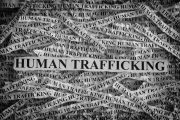
Did you hear about the white cops indicted in Freddie Gray’s death? You likely did.
Did my opening question cause you to take exception? It likely didn’t — but it should have.
Because half the officers (shown) charged in Baltimore drug dealer Freddie Gray’s April 12 death are black.
Yet in a case all about race — with the chant and hashtag “Black Lives Matter” and with vows to attack white police officers — this racial fact has been conspicuously absent from most reportage. But given that the Gray story has been a white/black thing, isn’t the knowledge that his arrest was actually a black/white/black thing relevant to it? Might this knowledge have quelled at least a bit of the racial unrest and perhaps saved some property and people from an ill fate in Baltimore? Could the omission of this fact be seen as an attempt to rub resentments raw?
My, a conspiracy theorist could almost think that someone in America wants division, racial animosity, rioting, and strife.
It’s no surprise that half the Gray case officers are black. Half the Baltimore force is black. And this isn’t remarkable because the city is 70 percent black, with a black mayor, black police chief, and largely black (and completely Democrat) government. It’s called probability and statistics.
And when one ignores hard statistics in favor of non-representative anecdotes and half truths, it’s often called prejudice.
And there are many ignored (and spun) statistics — and hence much prejudice — surrounding the police-shootings issue. For example, ex-NAACP president Ben Jealous wrote last month, “Accounting for relative population size, black people died at the hands of Maryland police 10 times as often as white people.” This may be true, but assuming it’s indicative of “racism” is like supposing that men being struck by lightning six times as often as women means that electricity is biased against men. When hearing that something is disproportionate to something else, we should ask: What other factors exist that it might be disproportionate or proportionate to?
Accounting for relative population size, male lightning strikes are disproportionate to female lightning strikes. But they’re not disproportionate to the greater time men spend outdoors and the greater risks they take. To provide another example, given that virtually all those shot by police are male, should we conclude that cops are biased against men?
As for racial disparities, first note that relative to the racial breakdown nationwide, black men are shot by police 3.5 times as often as are white men. Yet digging into the statistics is necessary for perspective. As ex-Baltimore cop Peter Moskos, now an assistant professor at CUNY’s John Jay College of Criminal Justice and author of Cop in the Hood, wrote, “Adjusted for the homicide rate, whites are 1.7 times more likely than blacks [to] die at the hands of police. Adjusted for the racial disparity at which police are feloniously killed, whites are 1.3 times more likely than blacks to die at the hands of police.”
FBI statistics bear this out. During the last 10 years, 55 percent of those who have murdered police officers have been “white,” despite whites being 67 percent of the population; however, 46 percent of felonious cop killers have been black, a group representing only 13 percent of the population. (Note that this reflects overall homicide patterns: Blacks commit approximately 50 percent of all murders in the United States.) Yet even this is deceptive because the FBI included Hispanics in the “white” category; in other words, the percentage of police officers murdered by non-Hispanic whites is undoubtedly lower than the percentage murdered by blacks.
So what does this mean? Relative to level of criminality, the number of blacks shot by police is not disproportionate — the number of whites is. If you’re a criminal who wants to avoid being shot by cops, you’re better off being black than white.
This is no surprise considering a Washington State University study last year showing that police are actually more willing to shoot white suspects than black ones. How could this be? As Professor Moskos explained, officers who shoot blacks experience “more political fallout.” And that’s putting it mildly. After all, might you not think twice about shooting a black suspect if, as with ex-Ferguson policeman Darren Wilson, it may mean being crucified in the media, receiving death threats, having to go into hiding, and the end of your career?
As CDC research tells us, during the 13-year period 1999 to 2011, 1,130 blacks were killed by police — along with 2,151 whites. And among the latter, many newsworthy stories can be found, such as those of Iraq military veteran James Whitehead, 20-year-old Utah man Dillon Taylor, and Alabama teen Gil Collar. All three were white. All three were unarmed. All three were shot by non-white police officers, two of whom were black.
And all three stories were ignored by national media.
Moreover, as pundit Larry Elder pointed out last December, “In the last several decades the numbers of blacks killed by cops are down nearly 75 percent.” Despite this, reportage on police shootings of blacks — and the attendant protesting and rioting — are way up. This prompted Elder to ask, “So what’s driving this notion that there is now an ‘epidemic’ of white cops shooting blacks…?”
Prejudice.
At least that’s a big part of the explanation. What else do you call it when people ignore the facts and push a narrative — involving negative characterizations of certain groups (e.g., police and whites) — completely contrary to the facts?
Related to the police-shootings subject, there’s one more example of prejudice-driven decision-making that bears mention. Race baiter Al Sharpton and others have used their false narrative to call for the nationalization of the police. But how could this possibly improve policing? Our local-control model ensures that if we don’t like our town’s law-enforcement policies, we can vote for a different sheriff or mayor (who may appoint the police chief) next election. But what recourse do we have if our cops are controlled by Washington bureaucrats a political world away?
Baltimore is a prime example. If blacks don’t have a police force to their liking in a city with a black mayor, black police chief, and mostly black politicians — voted into office by a population 70 percent black — how will it help if their law-enforcement policy is determined by federal officials voted into office by a national population 87 percent non-black?
Having said all this, there is one thing the leftists are right about: America is still rife with prejudice. If they really want to know where it lies, however, all they need do is look in the mirror.
Related articles:
Drug Dealer Freddie Gray’s Business Was Hurting Black Kids
Sheriff: Baltimore Police Ordered to “Stand Down” Amid Riots




